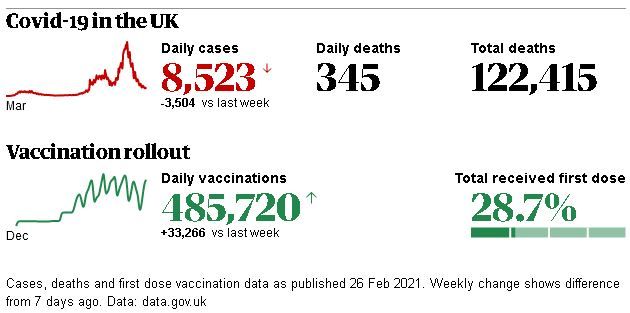Adviser calls for continued adherence to lockdown, as age-based phase 2 of vaccine programme announced
Ministers and scientific advisers have urged the public not to give up on strict lockdown rules, amid worries that the very obvious success of the UK vaccination programme and the arrival of spring are causing people to take more risks.
“Do not wreck this, we are so close,” said Jonathan Van-Tam, the deputy chief medical officer for England, after Downing Street confirmed plans for the second stage of the vaccination programme, due to offer at least a first dose to all adults by the summer.
Van-Tam said he had been “besieged with people writing in saying ‘I have had the vaccine and essentially can I start breaking the rules’.” The answer to that was no, he said, as the country was not yet “in the right place … it is too early to relax”.
The second stage of the vaccination programme will be based on age rather than occupation or clinical vulnerability, prompting a backlash from unions representing frontline workers, as well as patients’ groups.
Van-Tam said an age-based rollout would be quick and straightforward, and people should worry less about their place in the queue than “making sure that queue moves really fast”.
He and Matt Hancock, the health secretary, used a Downing Street press conference unveiling the vaccination plans to urge caution, even as official statistics indicated that the number of people in England contracting Covid had halved in the past fortnight.

Rates of hospital admissions and deaths were still “far too high”, Hancock said. Van-Tam called up what he termed “quite sobering” slides showing a rise in coronavirus cases in some parts of the country, including the Midlands and parts of the west coast of England.
“Although it is generally good news, I’m afraid it is better news in some places than it is in others and this is not a battle that we have won yet,” he said.
Van-Tam, who has gained a reputation during the pandemic as the government’s most effective and evocative communicator, said there were “some worry signs that people are relaxing, taking their foot off the brake at exactly the wrong time”, likening it to a football match in which one side had taken a 3-0 lead.
He said: “But how many times have you seen the other side take it 4-3? It is too early to relax. Just continue to maintain discipline and hang on. Just a few more months. Do not wreck this now, we are so close.”
Hancock and Van-Tam defended the next stage of the vaccine plan, unveiled by the Joint Committee on Vaccination and Immunisation (JCVI) on Friday and endorsed by Downing Street. Phase 2 will begin with people aged 40-49, progressing to those aged 30-39, then everyone aged 18-29, with a target date for first doses by the end of July.
With public health experts saying it would be logistically difficult to target people by job, potentially slowing the rollout, Hancock said: “Our moral duty is saving lives first, and that’s what we’ve done.”
Van-Tam said professions with the highest Covid death rates included restaurant workers, food processing staff and cab drivers, who would need to be prioritised in any jobs-based rollout.
“You can see that is going to be very difficult because of the multiplicity of occupations that would need to be called forwards,” Van-Tam said. “And doing that is going to damage the pace of the vaccine rollout so much. And the big win, actually, is in speed.”
But the plans prompted fury from some unions, with the Police Federation of England and Wales calling it “an utter betrayal of police officers”. John Apter, the chair of the federation, said ministers had abdicated responsibility to “hide behind the science of the JCVI”.
Paul Whiteman, the general secretary of school leaders’ union NAHT, said the logistical difficulties of a job-based rollout was “not a good enough reason not to prioritise the needs of committed professionals”.
Mick Pimblett, the assistant general secretary of the Prison Officers Association, said that even on Friday morning he had been led to believe members would be prioritised, given their role in a closed, confined environment.
Blood Cancer UK said people living with the disease, who have been vaccinated but are hugely vulnerable, would be “devastated” that fellow household members had not been prioritised.
“The JCVI have made a bad decision that will needlessly put the lives of people with blood cancer at risk,” said Gemma Peters, the charity’s chief executive.
Sarah Woolnough, the chief executive of Asthma UK, said the decision to not prioritise all people with the condition – people with particularly severe asthma were included in phase 1 – would leave some feeling “anxious, angry and ignored by government”.
But Prof Wei Shen Lim, the Covid-19 chair for JCVI, said an occupation-based vaccine programme had never been tested before on a large scale in the UK, and there were difficulties associated with it, such as people’s occupations not necessarily being recorded in their health records.
He said: “The evidence is clear that the risk of hospitalisation and death increases with age. The vaccination programme is a huge success and continuing the age-based rollout will provide the greatest benefit in the shortest time, including to those in occupations at a higher risk of exposure.”















